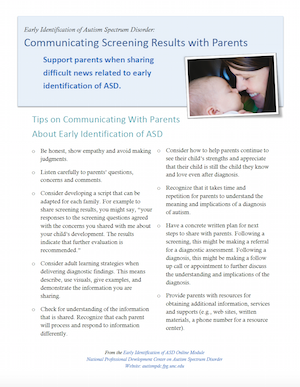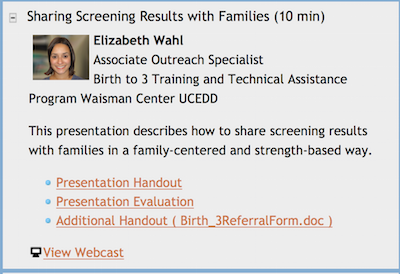Communicating Screening and Diagnostic Results with Parents
Communication of findings to parents is an essential part of early identification and diagnosis of ASD.
Parents are often the first to recognize that something is different in their child’s development. By the time surveillance and screening is conducted, some parents may have already had concerns about their child’s development. It is important to consider a parent’s perceptions when discussing with them your developmental concerns and questions about red flags for ASD. The direction of a conversation might progress differently with a parent who has already been wondering if their child is showing characteristics of ASD compared to a parent who has not considered the possibility.
If you are a professional, for a parent with questions about their child’s development, start a conversation with recognition of the concerns followed by queries for more detailed descriptions. If a physician, child care provider, or other family member first notices the concerns, the conversation would start differently.
The conversation might start with a statement of concern, such as, “I’ve noticed that your child isn’t showing an interest in what you are experiencing together. Have you noticed this?”
Allow for exchanges with families within context of conversations
These scenarios create a context for those conversations that provide exchanges with families, rather than reporting to families, within which a diagnosis of ASD is delivered.
Choose language carefully
It is important to choose language carefully and give a clear message about the findings. If further evaluation is recommended due to concerning screening results, say so. If a diagnostic assessment indicates the diagnosis of autism, say so. Concurrently, if a screening or diagnostic assessment indicates no concerns, it is equally important to assure parents that their child’s development is on track with typical development or to highlight concerns for future follow up.
Be prepared for parents' emotional responses
Parents will have a range of emotional responses to new developmental or diagnostic information about their child.

Support parents when sharing difficult news related to early identification of ASD.
View Tips on Communicating Screening Results with Parents
For more guidance, view this video webcast form the Wisconsin Medical Home Webcast Series.
Sharing Screening Results with Families
Website URL: http://www.waisman.wisc.edu/connections/webcast.php



